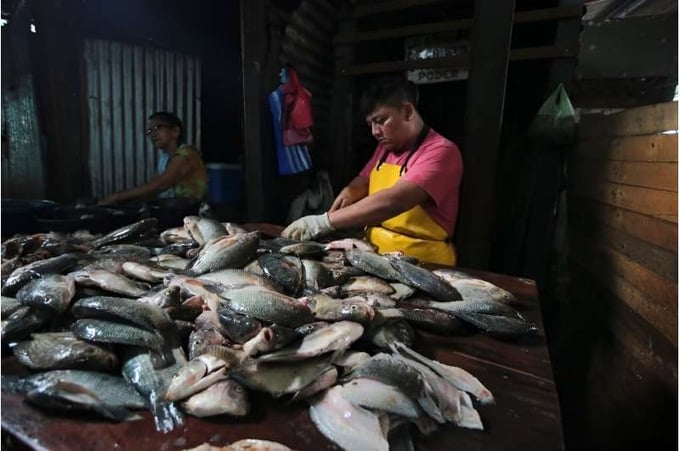December 8, 2025 | 02:00 GMT +7
December 8, 2025 | 02:00 GMT +7
Hotline: 0913.378.918
December 8, 2025 | 02:00 GMT +7
Hotline: 0913.378.918

A man sells fish in a market in the Nicaraguan capital Managua.
With global demand for aquatic foods expected to keep growing, an increase in sustainable production is vital to ensure healthy diets, the United Nations's Food and Agriculture Organization said.
In 2022, aquaculture yielded 94.4 million tonnes of aquatic animal production -- 51 percent of the total, and 57 percent of the production destined for human consumption, it said.
"Aquatic systems are increasingly recognized as vital for food and nutrition security," according to the report, released as experts gathered in Costa Rica for talks on ocean conservation.
"Because of their great diversity and capacity to supply ecosystem services and sustain healthy diets, aquatic food systems represent a viable and effective solution that offers greater opportunities to improve global food security and nutrition," it added.
While wild fisheries production has stayed largely unchanged for decades, aquaculture has increased by 6.6 percent since 2020, the report noted.
The sustainability of wild fishery resources remained a cause for concern, it added.
The proportion of marine stocks fished within biologically sustainable levels decreased to 62.3 percent in 2021, 2.3 percent lower than in 2019, the report said.
"Urgent action is needed to accelerate fishery stock conservation and rebuilding."
Call for investment
With the world's population projected to reach 8.5 billion by 2030, "providing sufficient food, nutrition and livelihoods for this growing population demands significant investments," it added.
"Aquaculture has a major role to play, particularly in Africa where its great potential is not yet realized," the report said, noting that more than 40 percent of the world's population cannot afford a healthy diet.
Aquatic products remain one of the most traded food commodities, generating a record $195 billion in 2022 -- a 19 percent increase from pre-pandemic levels, it said.
"Despite these significant achievements, the sector still faces major challenges from climate change and disasters, water scarcity, pollution, biodiversity loss" and other man-made impacts, it added.
The report was released to coincide with a meeting in San Jose of country representatives, scientists and international experts to prepare for the third UN Ocean Conference, to be held in France in 2025.
United Nations Under-Secretary-General for Social Affairs Li Junhua said at the start of the talks that protecting the ocean was "not an option but an imperative."
Costa Rica's President Rodrigo Chaves, host of the two-day meeting, said that if the world does not act, "we as a generation would be taking away the future of humanity."
Participants will debate issues including the capacity of the ocean to absorb carbon dioxide, the need for sustainable fishing and tackling marine pollution.
(AFP)

(VAN) Newly designated initiatives in Australia, Canada and South Africa represent science-based and inclusive examples of ecosystem restoration.

(VAN) Rice-based food has been selected as Japan's 'Dish of the Year' for 2025, reflecting public interest in the stable supply of the country's staple food amid a recent rice shortage.

(VAN) A research project in Sweden explored how valuable substances can be extracted from organic waste, such as food waste and animal manure, and how this loop can be closed by producing animal feed.

(VAN) Average retail fertilizer prices continued to be mostly higher during the fourth week of November 2025, according to sellers surveyed by DTN.

(VAN) Inaugural Appeal focuses on cost-effective agricultural solutions that link urgent needs with long-term resilience.

(VAN) Landmark SOLAW 2025 report reminds us that resources for food are not infinite.

(VAN) Climate change is a growing concern for agricultural productivity and several studies have focused on how climate variations can impact crop yields.